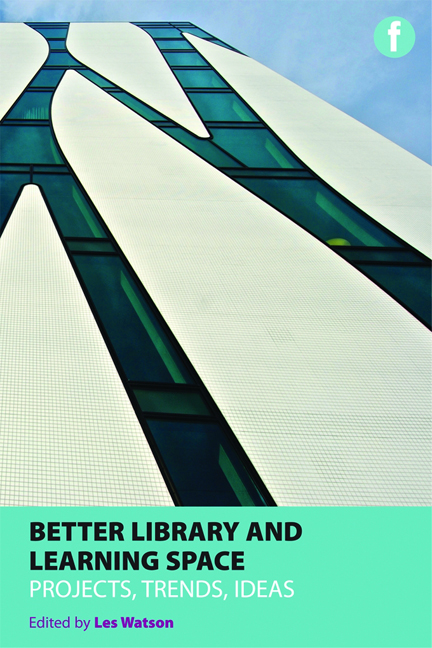Book contents
- Frontmatter
- Contents
- Case studies
- Acknowledgements
- Contributors
- Introduction – about this book
- PART 1 PROJECTS AND TRENDS
- PART 2 TRENDS AND IDEAS
- PART 3 IDEAS AND FUTURES
- Introduction
- 11 Beyond space: access is all – or is it?
- 12 Thinking inside the box
- 13 Nothing has changed/everything has changed – the enduring aspects of learning
- 14 Books, nooks and MOOCs
- 15 The researcher's view: context is critical
- 16 Libraries in the network society: evolution, revolution, extinction?
- 17 Powered by learning: developing models of provision to meet the expectations of new generations of students
- 18 The library has left the building
- 19 Beyond analogue: the learning studio as media-age library
- 20 3D libraries for 3D smarting
- 21 Learning landscapes, the library and the University of Lincoln: efficiency, effectiveness, expression and experimentation
- 22 Viral design: learners building better environments together
- 23 The interior designer's view
- 24 Furniture fit for the future – a brief exploration of library and learning furniture today and for the coming generation
- 25 Conclusions
- Index
15 - The researcher's view: context is critical
from PART 3 - IDEAS AND FUTURES
Published online by Cambridge University Press: 08 June 2018
- Frontmatter
- Contents
- Case studies
- Acknowledgements
- Contributors
- Introduction – about this book
- PART 1 PROJECTS AND TRENDS
- PART 2 TRENDS AND IDEAS
- PART 3 IDEAS AND FUTURES
- Introduction
- 11 Beyond space: access is all – or is it?
- 12 Thinking inside the box
- 13 Nothing has changed/everything has changed – the enduring aspects of learning
- 14 Books, nooks and MOOCs
- 15 The researcher's view: context is critical
- 16 Libraries in the network society: evolution, revolution, extinction?
- 17 Powered by learning: developing models of provision to meet the expectations of new generations of students
- 18 The library has left the building
- 19 Beyond analogue: the learning studio as media-age library
- 20 3D libraries for 3D smarting
- 21 Learning landscapes, the library and the University of Lincoln: efficiency, effectiveness, expression and experimentation
- 22 Viral design: learners building better environments together
- 23 The interior designer's view
- 24 Furniture fit for the future – a brief exploration of library and learning furniture today and for the coming generation
- 25 Conclusions
- Index
Summary
Introduction
Our ideas about future models of the library focus on the needs of researchers. Our thinking is informed by our own experiences as both users and directors of library and information services in research institutions, and by debates on future roles for library and information professionals in the network world – a world where automation, digitization and socialization of data, information and knowledge, and disintermediation, are transforming the scholarly landscape. We begin with three reasons why library support for research is a critical issue, and then reflect on the current situation and environmental forces shaping provision for researchers, before setting out our thoughts about future services and spaces for research.
The library and research
First, higher education institutions across the globe continue to identify teaching and research as two distinct missions (Scott, 2006), and most academic libraries similarly define their roles in education and research as related, but separate, elements of their mission (Aldrich, 2007). Second, surveys in several countries show that researchers’ experiences and perceptions of libraries are not altogether positive (Daniels, Darch and de Jager, 2010; Schonfeld and Housewright, 2010; MacColl and Jubb, 2011) and their views about future priorities often differ from librarians’ views (RIN, 2007). Third, while changes in teaching and learning have largely driven spatial transformations of academic libraries over the past 20 years, we expect changes in research and scholarship to have a more central role over the next two decades in transforming and re-engineering libraries to meet the needs of both researchers and learners (Lyon, 2012).
Current provision and usage
For most people, the idea of a library is inseparable from a collection of books and periodicals, a perception that has continued into the network world, despite the arrival of digital technologies, new media and online services. Library requests for research assistance have given way to self-help and mutual support; few people use ask-a-librarian services and information seekers rarely start their search on library websites (OCLC, 2010). Academic researchers mainly use electronic resources, which they access remotely, with only arts and humanities researchers visiting libraries regularly, but less often than before (RIN, 2007). Faculty members rarely consult a librarian or use the library catalogue to begin their research, preferring network-level services, including general-purpose search engines, as well as services targeted at academics (Schonfeld and Housewright, 2010).
- Type
- Chapter
- Information
- Better Library and Learning SpaceProjects, trends and ideas, pp. 183 - 192Publisher: FacetPrint publication year: 2013



